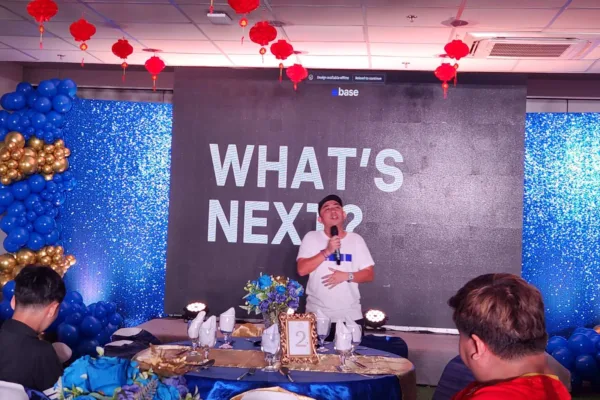Special Report by Edielyn Mangol, Reporter
In a groundbreaking move to modernize governance and promote transparency, the Philippines is set to pilot a blockchain-based budget tracking system under the Department of Public Works and Highways (DPWH).
The initiative aims to ensure that infrastructure funds are allocated, monitored, and spent with integrity — minimizing corruption risks and improving accountability across all stages of project implementation.
This development marks a historic first step in the country’s public-sector digital transformation, as blockchain technology — long associated with cryptocurrency and fintech — is now being deployed for social good and institutional reform.

The pilot project will use the “Integrity Chain,” a blockchain platform designed to provide real-time transparency in tracking funds and contracts, offering a glimpse into how emerging technologies can reshape government operations.
Blockchain: A new framework for transparency
At its core, the blockchain budget pilot focuses on ensuring that every peso allocated to public infrastructure projects can be traced and verified from end to end.
Using the Integrity Chain platform, budget allocations, procurement details, contracts, and project milestones will be uploaded to an immutable digital ledger. This ledger cannot be easily altered or tampered with, making it an ideal solution for maintaining the integrity of public spending records.
Through this system, the DPWH can now closely monitor how funds flow through different stages of a project — from budget approval and disbursement to contractor payments and completion milestones. The platform also allows stakeholders, including oversight bodies and even the public, to view key project information, fostering greater transparency and accountability.
What sets this initiative apart is its partnership-driven approach. The Blockchain Council of the Philippines (BCP) is providing full support for the pilot, including one year of platform access, technical training, and cybersecurity services — all at no cost to the government. The collaboration exemplifies a strong public-private synergy aimed at tackling a long-standing challenge in governance: the lack of transparent systems for tracking infrastructure budgets.
By leveraging blockchain, the DPWH aims not only to digitize record-keeping but also to introduce a new layer of trust and verification into the country’s infrastructure ecosystem. This move has the potential to strengthen investor confidence, attract foreign aid partners, and reduce the inefficiencies and leakages that have historically plagued large-scale public projects.
Strengthening governance through technology
For decades, infrastructure development in the Philippines has been hampered by issues related to inefficiency, overlapping bureaucratic processes, and corruption.
Projects have often been delayed or marred by irregularities — from ghost contracts and double entries to the misuse of funds. The blockchain pilot seeks to address these pain points by creating a digital trail that can be publicly audited and independently verified.

At the Kapihan sa Manila Bay breakfast forum, BCP president Donald Patrick Lim reported that the BCP can do the pilot within the year.
“It’s privately funded. The private sector is the one funding it. The council is the one working with all the stakeholders to execute it,” Lim said.
Unlike traditional data systems, blockchain operates on the principle of immutability. Once data is entered, it becomes part of a permanent, tamper-resistant record distributed across multiple nodes. This means that any attempt to manipulate or delete information can be easily detected. For the DPWH, this provides a transparent and incorruptible way to document every financial and operational transaction related to infrastructure projects.
In addition to enhancing transparency, the initiative may also streamline inter-agency coordination. With data stored securely and uniformly on the blockchain, agencies involved in budgeting, procurement, and auditing can access consistent and up-to-date records. This reduces paperwork, minimizes discrepancies, and enables faster decision-making.
More importantly, the pilot reinforces the Philippines’ commitment to digital transformation in governance. It aligns with the government’s broader agenda of promoting open data, reducing red tape, and building citizen trust through technology. The project could eventually serve as a model for other government departments looking to implement similar systems in areas such as health, education, and social services.
Challenges and next steps

While the blockchain budget pilot holds immense promise, it also faces challenges that will determine its long-term viability. Integrating blockchain into an existing government infrastructure is not a simple plug-and-play process. It requires data standardization, staff training, and careful planning to ensure that the technology is applied correctly and securely.
Cybersecurity is another major concern. Although blockchain is inherently secure due to its decentralized nature, the systems connected to it — such as databases and applications as well as user interfaces — must be equally fortified. Any vulnerabilities could compromise sensitive information or undermine trust in the system.
Scalability is also a key consideration. The pilot is initially being deployed for selected infrastructure projects, particularly those financed through foreign assistance from institutions like the Asian Development Bank or the Japan International Cooperation Agency. However, for blockchain-based budgeting to become a standard practice across all government projects, there must be clear frameworks for expansion, funding, and long-term management.
Finally, the success of this initiative will depend not only on technology but also on people. Adoption across agencies requires a shift in mindset — from traditional paper-based accountability to digital, data-driven transparency. Government personnel, contractors, and the public must all understand how to interpret and use blockchain data effectively. Public dashboards, user-friendly reporting tools, and citizen engagement initiatives will play a crucial role in achieving this goal.
Looking ahead, the pilot will serve as a testing ground for what could become a transformative governance model. If it delivers measurable results — such as faster project completion, reduced budget discrepancies, and improved audit outcomes — the Philippines may soon extend the system to other departments and sectors.
A step toward digital Trust
The blockchain budget pilot under the DPWH represents more than just a technological upgrade; it symbolizes a cultural shift toward greater transparency and accountability in public service. By digitizing the budgeting and procurement process through blockchain, the Philippines is signaling to both citizens and investors that it is serious about fighting corruption and building trust in government institutions.

If successful, the initiative could redefine how public funds are managed and monitored, not only in infrastructure but across the entire government ecosystem. It could also inspire other Southeast Asian nations to explore similar models, positioning the Philippines as a leader in blockchain-driven governance.
This pilot is a test — not only of technology but of institutional will. Its success will hinge on sustained collaboration between the public and private sectors, continuous evaluation, and the ability to adapt to challenges as they arise. But one thing is certain: this initiative has already set the stage for a future where transparency isn’t just a goal — it’s built into the system itself.








